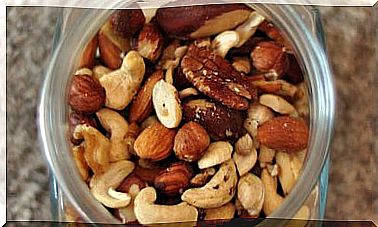What Is Xanthan Gum And How It Helps In The Diet
Xanthan gum is a food additive that has no protein or fat and stands out for its high content of dietary fiber. Thus, it is an ideal complement for athletes and those who want to watch their weight.

Those who follow gluten-free diets will be familiar with the term xanthan gum. However, if you are not one of them, surely these words will be strange to you. Don’t worry, in this article we will explain what it is about and what it has to do with your diet.
This element is part of the diet of many people, although some are not aware of it. Many industrial products contain it due to its ability to modify the texture of the final food.
What is xanthan gum?
Xanthan, xanthic, santana or xanthan gum is a high molecular weight polysaccharide produced and extracted naturally by the microbiological species of bacteria called Xanthomonas campestris . It can also be found in certain vegetables such as cauliflower or broccoli, among others.
It is made from natural ingredients. On various occasions it is derived from the fermentation of corn. For this reason, those intolerant people should take precautions.
Its physical characteristics are presented in the form of a white powder, which dissolves easily in water, regardless of temperature. High-viscosity solutions can be obtained, which are added as a natural and concentrated additive.
Due to its high ability to dissolve when mixed with a liquid and to be a stabilizer, xanthan gum has become one of the main polysaccharides used in the food industry. Whether in sauces, drinks or dairy products, among others.
This polymer is known as E-415. This code is probably familiar to you if you are one of those who read the labels of the products you buy in supermarkets. The vast majority contain it.
How does it help your diet?

The main use of xanthan gum is in the food sector. In this environment it is used as a thickener and emulsifier for all kinds of foods.
Likewise, it could also be the ideal companion in your diet. It contains several interesting properties for the body, which we will review below.
Take care of your figure
Xanthan gum is protein and fat free. It is characterized by its high component in dietary fiber, which makes it an ideal ingredient for athletes and all those who are interested in taking care of their weight and body figure. Remember that fiber intake has proven to be essential in order to prevent intestinal-type pathologies.
Constipation
When ingested, the extra supply of fiber that xanthan gum contains will make it a natural supplement that will serve as a laxative to improve intestinal transit. It is ideal for digestive health, as it relieves stomach bloating (bloating) and to combat constipation.
Diabetes
Due to its ability to facilitate the absorption of nutrients in the digestive process, xanthan helps reduce the chances of suffering from diabetes, thanks to the fact that it lowers cholesterol and blood sugar levels. This is demonstrated by a study published in The American Journal of Clinical Nutrition.
Celiac Disease

People who are intolerant or allergic to gluten should eliminate this protein from their diets. In fact, they cannot consume rye, wheat or barley, and they restrict themselves from eating pasta, bread and drinking beer.
The textures and flavors of gluten-free baked goods are different. Drier, sandier and more brittle. However , xanthan gum represents a natural substitute that will allow you to bind, thicken and stabilize breads, pizzas and even biscuits, when you are preparing them. There are several investigations that show the potential of this substance within food technology.
There are two basic ways to use xanthan gum in your baking mixes:
- Add it directly to the gluten-free flour.
- Dissolve it in water, an option that most people use to make their preparations more consistent and fluffy.
If you do not know how much you should use to prepare your mixtures, you can be guided by the recommendation made by the State Agency Official State Gazette. In their bulletin number 44 they advise that the dose of xanthan gum cannot exceed 10 grams for each kilogram of the product.
Sjogren’s syndrome
This immune system disorder is characterized by frequent dryness of the eyes and mouth. In this case, xanthan also works as the ideal supplement, as it can be used to facilitate the production of saliva.
Side effects
Remember that excesses always hurt. So regulate your daily intake of xanthan gum very well. The recommended dose is 15 grams a day to avoid possible side effects.
Exceeding the stipulated daily amount could cause gas, nausea, dizziness and bloating. Likewise, people who are very sensitive to their stomachs may experience these symptoms even before the total measure is exceeded.
In any case, if you want to include it in your diet to test all the benefits that we have explained to you, we recommend that you consult a specialist. Remember that each body is different and, therefore, has particular requirements. With professional advice you will ensure that the body will have exactly what it needs.









